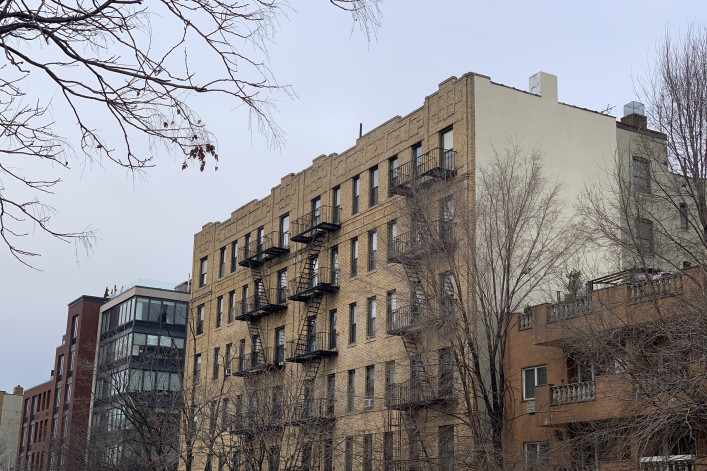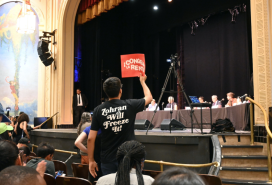Ask Sam: How do you get a buyout to leave a rent-stabilized apartment?
- Landlords have fewer incentives to buy out rent-regulated tenants as a result of the 2019 rent law changes
- Buyouts may be available in co-op or condo conversions, with 'Frankenstein apartments, or demolitions

Landlords who plan to gut or demolish a rent-regulated building and develop a new property on the site are particularly willing to offer buyouts.
I’ve heard landlords aren’t giving rent-stabilized tenants buyouts anymore. Is this true?
Landlords do sometimes offer rent regulated tenants money or free rent in exchange for taking possession of their apartments, though today buyouts are less common than they used to be, says Sam Himmelstein, an attorney at Himmelstein, McConnell, Gribben & Joseph who represents residential and commercial tenants and tenant associations.
Since the passage of the Housing Stability and Tenant Protection Act of 2019, landlords have fewer incentives to buy out rent regulated tenants and are less likely to offer huge buyouts. The main reason for this: HSTPA eliminated vacancy deregulation, which allowed landlords to deregulate rent-stabilized apartments after the tenants moved out and the rent reached a certain threshold.
“Landlords could deregulate rent-controlled and rent-stabilized apartments and then charge market rent, and the difference was tremendous in many cases,” Himmelstein says. “They were willing to pay large buyouts because they’d make that money back eventually. That was the main scenario for buyouts, and that’s gone for the most part.”
When a landlord will offer a buyout
There are a few situations remaining in which landlords have an incentive to buy out stabilized tenants. One is when a stabilized tenant is living in a building that is a co-op or condo, or is in the process of being converted to one.
“The apartment would be instantly de-regulated if the tenant leaves, and the landlord can then sell or rent the unit at market-rate,” Himmelstein says. “Those tenants still frequently get buyouts.”
There’s no specific formula for calculating the buyout amount, but landlords typically offer these tenants a percentage of what the apartment might sell for on the market.
However, since the passage of HSTPA, co-op and condo conversions have all but disappeared, since the new law requires that 51 percent of tenants in occupancy must buy their units for the conversion plan to go through.
“While you do see buyouts in condos, these are mostly in buildings that were already converted in the past,” Himmelstein says. “Sometimes a sponsor will sell their unit to someone, and the new person will come in and offer a buyout to the tenant in occupancy.”
Another buyout scenario happens when landlords try to create “Frankenstein apartments” by combining two existing stabilized units into a larger one, or dividing one stabilized unit into two smaller ones. These landlords are then allowed to charge “first rent” on the new apartments, at whatever rate new tenants are willing to pay. These units remain stabilized but are rented for much more money than before they were renovated.
Tenants of stabilized units that the landlord wants to combine or chop up may be offered buyouts—for now. There is pending legislation, Himmelstein says, that could abolish this practice, and the DHCR is also considering doing away with the policy.
Some landlords will also offer to buy out rent-controlled tenants, whose apartments can be converted to rent-stabilization status, which often means higher rents.
“Even though those apartments go into rent-stabilization, the formula is such that landlords can get the apartment’s rent close to market-rate,” Himmelstein says. “If they serve the tenant with the new registration and give notice that they have 90 days to challenge the new rent, and those 90 days pass, that rent is locked in forever.”
Finally, landlords who plan to gut or demolish a rent-regulated building and develop a new property on the site are particularly willing to offer buyouts.
“Depending on the size of the project, the landlord stands to make millions and will usually pay tenants anywhere from six figures to multi millions,” Himmelstein says.
Keep in mind, though, that demolition and redevelopment plans take quite a while to come to fruition.
"He'd have to file a case at the Division of Housing and Community Renewal, and even though it’s not hard for landlords to prevail in these cases, they tend to drag on for years," Himmelstein says. “Landlords are incentivized to offer buyouts because they want certainty of possession of these apartments, and they don’t want to wait years.”
What you can get
If you are a stabilized tenant whose landlord plans to demolish the building, you may be entitled to a stipend, based on the difference between the rent you're paying now and what it would cost to get a new apartment. Tenants paying significantly below market rate, therefore, stand to get much larger stipends than ones paying a higher rent. However, in many demolition cases, tenants negotiate seven-figure buyout payments that are far above the stipend amounts.
Being the last stabilized tenant in your building may also provide you some added leverage.
"The landlord doesn't have to worry that if he pays them a certain number, other tenants will find out and come also looking for buyouts," Himmelstein says of holdouts. "Being the last man standing is always something that's valuable."
A buyout isn't a question of eligibility, he adds, but rather a number of objective and subjective factors, among the most significant the temperament and business practices of your landlord.
"Are they a cheapskate or a big spender? I find that when negotiating buyouts, there's often no rhyme or reason to it other than the individual I am dealing with," he says. "Some never pay buyouts, some pay less than others, and some just want to get it done quickly and will pay the maximum so they can move on."
Regardless, it's crucial that you speak to a lawyer before engaging in negotiations. Himmelstein cautions that a tenant who has had a conversation with her landlord about buyouts before retaining an attorney may have limited her prospects by suggesting an amount lower than what a lawyer could get.
"After a tenant says they'll take a certain amount, the landlord will probably say 'no way' to more," he says. "People begin negotiations and think they're being noncommittal, but they're not. Landlords are professionals who negotiate these things all the time."
Related:
Ask Sam: What does the new supermajority in Albany mean for NYC tenants? (sponsored)
Ask Sam: My landlord is demolishing our building. Is he allowed to evict me, and can I get a buyout? (sponsored)
Ask Sam: My building went co-op, but it's all still rentals. Should we be rent-stabilized? (sponsored)
See all Ask a Renters' Rights Lawyer
Sam Himmelstein, Esq. represents NYC tenants and tenant associations in disputes over evictions, rent increases, rental conversions, rent stabilization law, lease buyouts, and many other issues. He is a partner at Himmelstein, McConnell, Gribben & Joseph in Manhattan. To submit a question for this column, click here. To ask about a legal consultation, email Sam or call (212) 349-3000.



























